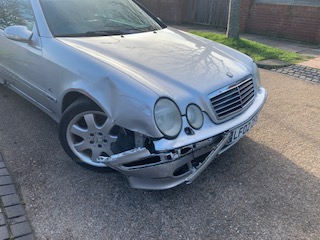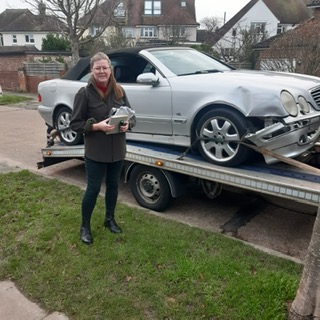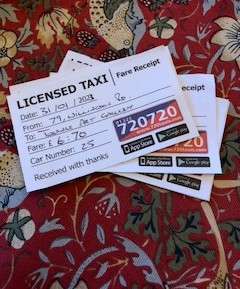The day before we were due to set off to a funeral in America, my car was involved in a minor road accident. A somewhat careless postal worker pulled out from between two parked cars and directly into me. Fortunately, no-one was hurt, but my poor old car.

This trusty vehicle had given me no bother for over ten years and I had no plans to replace it until it drove no more. Sadly, its age was against it and when I mentioned this to the insurance company, they immediately wrote it off. In truth, it was rather damaged and could only go in reverse – but still!
With the wonderful help of my friendly dog walker, I managed to sort the insurance and used his phone for photographs. Despite having driven since I was eighteen, I really didn’t know what to do in the case of an accident. Luckily, he did.
After several hours of phone calls, my friend Penny kindly took me to the car to empty it and to wave good-bye as it set off to the scrap yard.

Now what?
Our flight was the next day, so I didn’t have time to get the replacement car offered nor to use it for long afterwards, so I decided that in the interim, I would just take taxis when needed.
My intention was for this to be a short-term solution, until I discovered how expensive and rare good second-hand vehicles are. My husband got on with the research on our return and I got on with life. In order to get anything as safe and reliable as my old car, we’d need to spend upwards of £10,000. Following an emergency trip to the US and a wedding there in the summer, this was a cost too far.
Doing the maths

Despite life hurling lemons with gusto, I was determined not to be defeated. Could I turn this unfortunate incident into something good? It would be a challenge – but isn’t everything?
I decided to take a scientific approach and consider all options before making any expensive decision. These were:
- Buy a new car with the settlement and savings
- Buy a new car with the settlement and loan
- Use taxis
Like most people, my first thought was to of course get a new car. How would I cope without one? I have enough in savings to cover the costs and could manage car payments, but I am more than a little reluctant to dip into my very modest ‘pension’ savings to do so.
Running a car, let alone paying for one, is rather expensive. I would estimate around £1500 a year for someone with a reliable car and no claims on their insurance. That is around £125 per month or £30 per week. We seldom make these calculations because we believe we need a car of our own. But do we?
Taking an alternative
And this is my experiment. For the next month, I plan to allocate £125 to taxis and see if I use it. Since tomorrow is the first of the month, it is the perfect place to begin. I just need to remember to note all my journeys.
I’ve vowed not to take lifts nor to put people out. (But if my husband offers, I’ll accept!) If I need to get somewhere, I’ll get a taxi. If I feel frustrated at not being able to go places (such as Birling Gap) I’ll note it.

Taxis are not cheap. However, they are super convenient, avoid the frustration of parking and provide a stress free journey. When living in an urban area, they really are a solution to excess traffic and since they maximise mileage efficiency and usage, they are a little greener.
The walking cure
Following reading the excellent Landlines by Raynor Winn, in which her husband overcomes all the odds with a terrifying illness through walking the length of Britain, I have determined to make my own little journeys on foot. A thousand miles is currently far beyond me, but a mile? Perhaps even two is worth attempting.

Not having a car is adding to the incentive to practise the one thing that might conceivably arrest or even reverse my condition. I managed to take Hermione to the puppy park today and back. It is a mere 25 minutes round trip and I need to rest afterwards, but it is a start.
And if I can do that, I can work on doing more – literally step-by-step. I would consider myself a realistic optimist. I doubt I shall ever manage much, but maintaining independent movement is paramount and this will certainly help.
We have the benefit of a family car, which makes a tremendous difference. Yet, I am keen to see if we can manage with just one. And perhaps, just perhaps, going from careless to carless will not only bring me financial savings but physical gains.
